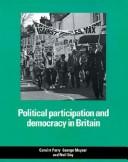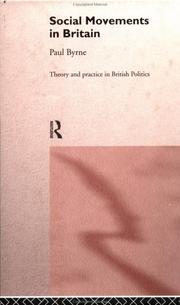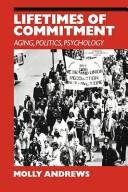| Listing 1 - 10 of 12 | << page >> |
Sort by
|
Digital
Year: 1838 Publisher: London R. Groombridge
Abstract | Keywords | Export | Availability | Bookmark
 Loading...
Loading...Choose an application
- Reference Manager
- EndNote
- RefWorks (Direct export to RefWorks)

ISBN: 0521332982 0521336023 0511558724 9780521336024 9780511558726 9780521332989 Year: 1992 Publisher: Cambridge: Cambridge university press,
Abstract | Keywords | Export | Availability | Bookmark
 Loading...
Loading...Choose an application
- Reference Manager
- EndNote
- RefWorks (Direct export to RefWorks)
Why do some people involve themselves in politics and others not? Which issues are they concerned with? What do they get out of it? Answering such questions is fundamental to understanding political life and the workings of liberal democracies. This book presents the results of one of the most extensive surveys ever undertaken on the levels and patterns of political involvement in Britain. It is based on the findings of a sample survey of nearly 1,600 people across England, Scotland and Wales as well as a further 1,600 men and women and nearly 300 leaders in six specially selected and contrasting communities. These people were asked about the extent to which they had taken political action, particularly at a local level, and the authors found higher levels of participation than previous research has revealed. They analyse these findings in terms of age, gender, social class and education and look at the reactions of local leaders to the efforts people make to influence them.
Political participation --- Participation politique --- #SBIB:328H214 --- Instellingen en beleid: Verenigd Koninkrijk --- Social Sciences --- Political Science --- Political participation - Great Britain. --- Political rights --- Civic rights --- Civil rights --- Citizenship --- Law and legislation
Book
ISBN: 9780230243354 0230243355 Year: 2011 Publisher: Basingstoke: Palgrave MacMillan,
Abstract | Keywords | Export | Availability | Bookmark
 Loading...
Loading...Choose an application
- Reference Manager
- EndNote
- RefWorks (Direct export to RefWorks)
Communication in politics --- Press and politics --- Political participation --- Communication in politics - Great Britain --- Communication in politics - Netherlands --- Press and politics - Great Britain --- Press and politics - Netherlands --- Political participation - Great Britain --- Political participation - Netherlands
Book
ISBN: 9781447326878 1447326873 9781447326885 1447326881 9781447326892 144732689X Year: 2015 Publisher: Bristol: Policy press,
Abstract | Keywords | Export | Availability | Bookmark
 Loading...
Loading...Choose an application
- Reference Manager
- EndNote
- RefWorks (Direct export to RefWorks)
One of the key issues of our time is the question of where power and governance should lie. Should they be centrally controlled, drawing on efficiencies of scale and gathered knowledge? Or should they be more locally distributed, so that they more closely represent the actual needs of people and communities? In Taking Power Back, Simon Parker makes a powerful case for the latter: centralization, he argues, has been largely a failure, breeding distrust among citizens--who, he shows, are beginning to take matters into their own hands. Offering policy recommendations and practical suggestions, Parker argues for a new kind of politics, one that can fully unleash society's creative potential.
Political sociology --- United Kingdom --- Political participation --- Great Britain --- Politics and government --- Political participation - Great Britain --- Great Britain - Politics and government - 21st century --- Power (Social sciences) --- Decentralization in government --- Grande-Bretagne --- Politique et gouvernement. --- Politics and government. --- Representative government and representation

ISBN: 0415071232 9780415071239 Year: 1997 Publisher: London: Routledge,
Abstract | Keywords | Export | Availability | Bookmark
 Loading...
Loading...Choose an application
- Reference Manager
- EndNote
- RefWorks (Direct export to RefWorks)
Social change --- Great Britain --- Social movements --- Political participation --- 316.423 --- #SBIB:324H74 --- #SBIB:328H214 --- Sociale bewegingen --- Politieke verandering: sociale bewegingen --- Instellingen en beleid: Verenigd Koninkrijk --- 316.423 Sociale bewegingen --- Movements, Social --- Social history --- Social psychology --- Social movements - Great Britain. --- Political participation - Great Britain.

ISBN: 0521422493 0521402808 0511571178 9780521422499 9780511571176 9780521402804 Year: 1991 Publisher: Cambridge: Cambridge university press,
Abstract | Keywords | Export | Availability | Bookmark
 Loading...
Loading...Choose an application
- Reference Manager
- EndNote
- RefWorks (Direct export to RefWorks)
This book is an exploration of the ways in which political belief is developed and sustained throughout the course of a lifetime. Through extensive interviews, it focuses on the lives of fifteen British men and women, aged between seventy and ninety, who have dedicated half a century or longer to working for social change and justice. From Dorothy Greenald's commitment to provision of adequate housing for prisoners' families to Walter Gregory's active service in the Spanish Civil War and Trevor Huddleston's vital role in the international Anti-Apartheid Movement, these men and women have been involved in both local and international struggles. Respondents discuss topics ranging from the importance of gender identity for their political activism, to their perceptions of recent events in Eastern Europe. The work is unusual in combining an investigation of individual lifelong political commitment with a wider consideration of the formation of social identity, aging and the interplay between individuals and their environment. Lifetimes of commitment will have a wide appeal amongst social psychologists, sociologists, social and oral historians and political scientists.
Political participation --- Social reformers --- History --- Interviews. --- Citizen participation --- Community action --- Community involvement --- Community participation --- Involvement, Community --- Mass political behavior --- Participation, Citizen --- Participation, Community --- Participation, Political --- Political activity --- Political behavior --- Political rights --- Social participation --- Political activists --- Politics, Practical --- Reformers --- Interviews --- Health Sciences --- Psychiatry & Psychology --- Political participation - Great Britain - History - 20th century. --- Social reformers - Great Britain - Interviews.
Book
ISBN: 0198274459 9780198274452 Year: 1982 Publisher: Oxford: Oxford university press,
Abstract | Keywords | Export | Availability | Bookmark
 Loading...
Loading...Choose an application
- Reference Manager
- EndNote
- RefWorks (Direct export to RefWorks)
Political participation --- Social classes --- Great Britain --- Politics and government --- -Social classes --- -Class distinction --- Classes, Social --- Rank --- Caste --- Estates (Social orders) --- Social status --- Class consciousness --- Classism --- Social stratification --- Citizen participation --- Community action --- Community involvement --- Community participation --- Involvement, Community --- Mass political behavior --- Participation, Citizen --- Participation, Community --- Participation, Political --- Political activity --- Political behavior --- Political rights --- Social participation --- Political activists --- Politics, Practical --- England --- Politics and government. --- -Great Britain --- Political participation - Great Britain --- Social classes - Great Britain --- Great Britain - Politics and government
Book
ISBN: 9783319701226 9783319701233 3319701223 3319701231 Year: 2018 Publisher: [Cham]: Palgrave MacMillan,
Abstract | Keywords | Export | Availability | Bookmark
 Loading...
Loading...Choose an application
- Reference Manager
- EndNote
- RefWorks (Direct export to RefWorks)
In this book a set of theoretical and methodological resources are presented to study the way in which protest, resistance and social movement discourses circulate through society and looks at the role of media and of communication in this process. Empirically, the focus of this book is on the UK's anti-austerity movement. 'The Circuit of Protest', as developed in this volume, is comprised of an analysis of the discourses of the anti-austerity movement and their corresponding movement frames, and the self-mediation practices geared at communicating these. The mainstream media representations and the reception of the movement discourses and frames by non-activist citizens are also studied. It is concluded that studying a movement through the prism of mediation provides a nuanced assessment in terms of failures and successes of the UK's anti-austerity movement
Community organization --- Mass communications --- United Kingdom --- Protest movements --- Protest movements in mass media --- Political participation --- History --- Great Britain --- Politics and government --- Economic conditions --- Social conditions --- Protest movements - Great Britain - History - 21st century --- Political participation - Great Britain - History - 21st century --- Great Britain - Politics and government - 2007 --- -Great Britain - Economic conditions - 21st century --- Great Britain - Social conditions - 21st century --- Communication. --- Social media. --- Europe—Politics and government. --- Media and Communication. --- Social Media. --- European Politics.
Book
ISBN: 3319547798 9783319547794 3319547801 Year: 2017 Publisher: [Cham, Switzerland]: Palgrave MacMillan,
Abstract | Keywords | Export | Availability | Bookmark
 Loading...
Loading...Choose an application
- Reference Manager
- EndNote
- RefWorks (Direct export to RefWorks)
This book brings together the established field of political communication and the emerging field of critical event studies to develop new questions and approaches. Using this combined framework, it reflects upon how we should understand the expression of democratic participation in mainstream mass media during the 2015 UK General Election and the 2016 referendum on Britain's membership of the EU. Are we now living in an era where democratic participation is much more concerned with spectacle rather than substantive debate? The book addresses this conceptual journey and reflects on differing models of democratic participation, before applying that framework to the two identified case studies. Finally, the authors consider what it means to be living in a period of democratic spectacle, where political events have become evental politics. The book will be of use to students and scholars across the fields of political science and culture and media studies, as well as wide readers interested in the current issues facing British politics. .
Political participation --- Referendum --- History --- Great Britain. --- Elections, 2015 --- Great Britain --- Great Britian --- European Union countries --- Politics and government --- Foreign relations --- Democracy --- Political communication. --- Elections. --- Great Britain-Politics and gover. --- Journalism. --- Political sociology. --- Political Communication. --- Electoral Politics. --- British Politics. --- Political Sociology. --- Mass political behavior --- Political behavior --- Political science --- Sociology --- Writing (Authorship) --- Literature --- Publicity --- Fake news --- Electoral politics --- Franchise --- Polls --- Politics, Practical --- Plebiscite --- Political campaigns --- Representative government and representation --- Political communication --- Sociological aspects --- Great Britain—Politics and government. --- Political participation - Great Britain - History - 21st century --- Referendum - Great Britain - History - 21st century --- Great Britain - Politics and government - 2007 --- -Great Britian - Foreign relations - European Union countries --- European Union countries - Foreign relations - Great Britian --- Communication in politics.
Book
ISSN: 15707571 ISBN: 9004272267 9789004272262 900426969X 9789004269699 1322223580 9781322223582 9789004269699 Year: 2014 Volume: 16 Publisher: Leiden: Brill,
Abstract | Keywords | Export | Availability | Bookmark
 Loading...
Loading...Choose an application
- Reference Manager
- EndNote
- RefWorks (Direct export to RefWorks)
This book investigates whether the presence of Muslim representatives in city councils improves substantive representation of Muslim interests across 32 London boroughs. It theorizes that descriptive representation of minorities leads to improved responsiveness to minority interests contingent on the percentage of minority representatives, the proportion of minorities in the district, level of party fragmentation among minority representatives, their political incorporation, and the electoral competitiveness of the district. It uses multivariate regression analysis to test the effects of these five explanatory variables. It validates the quantitative findings with case studies of three London boroughs while also investigating the role of representational styles of Muslim councillors on their political attitudes and behavior.
Local government --- City council members --- Muslims --- Minorities --- Ethnic minorities --- Foreign population --- Minority groups --- Persons --- Assimilation (Sociology) --- Discrimination --- Ethnic relations --- Majorities --- Plebiscite --- Race relations --- Segregation --- Mohammedans --- Moors (People) --- Moslems --- Muhammadans --- Musalmans --- Mussalmans --- Mussulmans --- Mussulmen --- Religious adherents --- Islam --- Aldermen --- City councillors --- City councilmen --- Council members, City --- Councillors, City --- Councilmen, City --- Municipal officials and employees --- Political activity --- Politics and government. --- Political participation --- Representative government and representation --- Politics and government --- Great Britain --- Political aspects --- Political aspects. --- Local government - Great Britain --- City council members - Great Britain --- Muslims - Political activity - Great Britain --- Muslims - Great Britain - Politics and government --- Minorities - Political activity - Great Britain --- Political participation - Great Britain --- Representative government and representation - Great Britain --- Great Britain - Race relations - Political aspects --- Great Britain - Ethnic relations - Political aspects
| Listing 1 - 10 of 12 | << page >> |
Sort by
|

 Search
Search Feedback
Feedback About UniCat
About UniCat  Help
Help News
News